Blog for reviewing and researching
Last active 60 minutes ago
Don't wanna be here? Send us removal request.
Text
Leasebound if it was fucking awesome. Aka if it had ME in it.

24 notes
·
View notes
Text
Leasebound (webcomic) Analysis Series Pt. 1
Chapters that will be covered:
Chapter 3: T is for 'Trouble' Analysis
Chatper 4: Endure
Chapter 5: Jaded
Chapters that will be briefly mentioned:
Chapter 6 Unfamiliar Waters
Chapter 10 Her Burden
Note: This analysis focuses on the legal aspects and broader research implications as well as black perspective, while the transphobic elements of the webcomic are covered in @kaleido-write's analysis work.
Creator's Summaries:
(Chapter 3) "Out of the goodness of her heart, Jaden agrees to fill in a shift for a sick co-worker. The nightclub 'Yon-ique' is hosting a novelty night, that seems to attract the wrong kind of attention."
(Chapter 4) "Jaden’s night takes a sharp turn for the worse after denying several men entry into the club. Luckily her trusty team is there to back her up when push comes to shove."
(Chapter 5) "Jaden is visibly shaken by the night’s events, which makes for a tense ride home. Parniya and Shez try to make the best of the situation."
The chapter opens with Jaden working as a substitute bouncer at Yon-ique nightclub, covering for an ill colleague. Throughout her shift, patrons frequently flirt with her, which the comic presents as endearing in its anime-inspired style. However, this portrayal overlooks the professional realities of security work - bouncers typically face flirtation as a manipulation tactic to gain free entry or special privileges, and are expected to maintain professional boundaries.

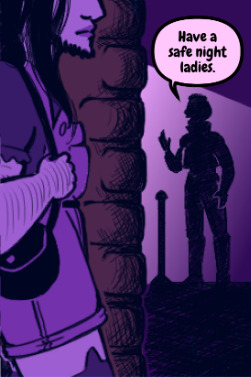
The narrative introduces an antagonist named Ginger, who belongs to what the creator terms the "AGP gang." These characters appear designed as deliberate caricatures of transgender women, serving primarily to facilitate Jaden's character development as a "heroic" figure protecting a women-only space.
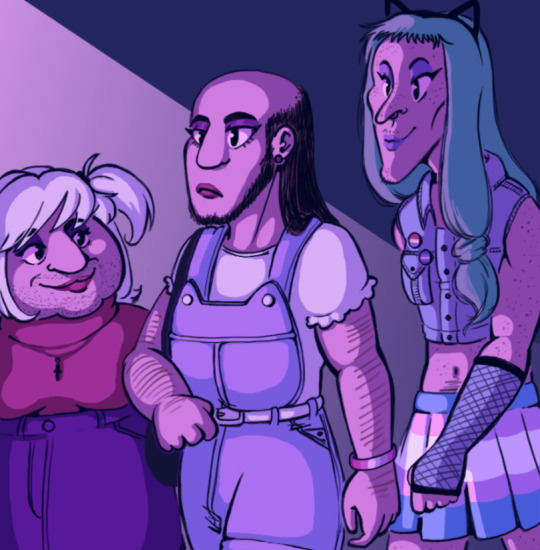

The conflict escalates when Jaden responds to Ginger's verbal provocations by physically restraining them in an armlock.
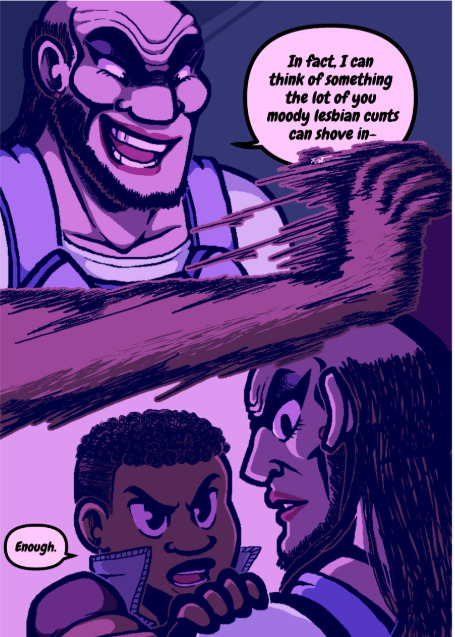
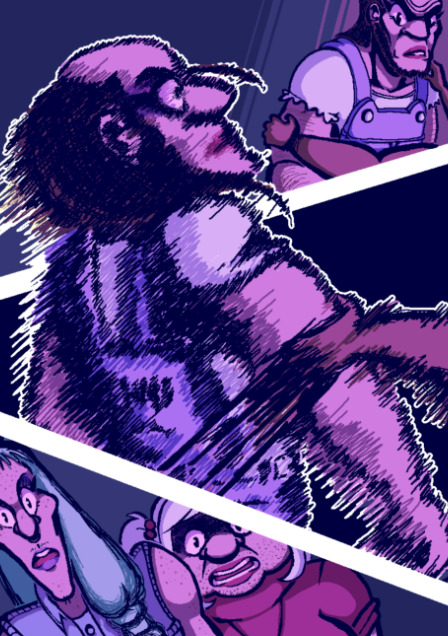
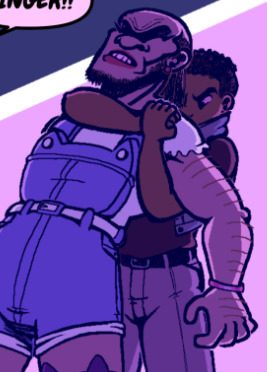
This response is problematic under Australian law. According to Section 10.4 of the Criminal Code Act 1995:
"A person carries out conduct in self-defense if and only if he or she believes the conduct is necessary to defend himself or herself or another person; and the conduct is a reasonable response in the circumstances as he or she perceives them."
The legal standard for reasonable force requires:
An imminent threat of harm
A proportionate response to that threat
In this scenario, Jaden's use of physical force in response to verbal insults, without any physical threat or attempted forced entry, would likely be considered disproportionate and potentially unlawful. More appropriate responses would have included:
Maintaining professional composure (which she initially demonstrated)
Issuing verbal warnings (which she did)
Requesting backup before escalating to physical intervention
Documenting the incident (which occurs later when law enforcement becomes involved)
By initiating physical contact without proportionate cause, Jaden's actions would likely fail to meet the legal standard for reasonable force under Australian law, despite the comic's framing of her response as heroic. In this situation, although Ginger is portrayed as the antagonist, they were forcibly restrained without justifiable cause beyond verbal altercations. In response, Ginger's actions constituted legitimate self-defense. However, this does not excuse the character's prior verbal harassment, which must be taken into consideration.
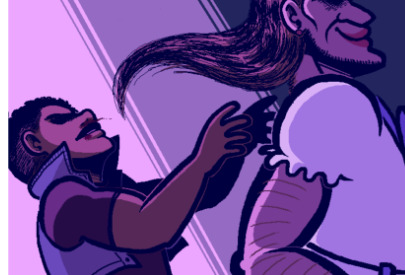
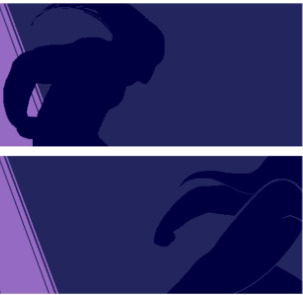
Character Analysis: Jaden and Problematic Tropes
Speaking from my perspective as a Black person and drawing from shared community experiences, there are several concerning elements in how Jaden's character is written, particularly through the lens of recognized literary tropes:
Key Tropes Present:
The Woobie/Sympathetic Sue: A character written to evoke excessive sympathy
Black Jezebel Stereotype
Ideal Hero/Martial Pacifist
Loved by All/Clueless Chick-Magnet
Doom Magnet
While character development through adversity is a standard narrative technique, Jaden's portrayal in these chapters raises several issues. The aftermath of the nightclub incident, while presumably intended to show vulnerability, instead infantilizes her character through what I'd describe as "uwu poor baby" framing. Rather than depicting authentic trauma processing, the writing reduces her to an object of pity.




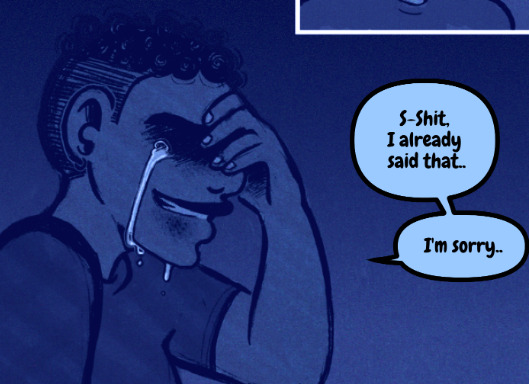
The dialogue between coworkers following the incident feels particularly artificial. Instead of meaningful character development, we get forced conversations attempting surface-level comfort. This is especially disappointing given the established backstory of Jaden's hardships (revealed in Chapter 10). A more nuanced approach might have shown:
A quiet car ride home with minimal dialogue
Subtle expressions of concern from colleagues
Internal reflection on the event's impact
Natural development of how this experience shapes her character
The dream sequence in Chapter 6 ("Unfamiliar Waters") further undermines Jaden's agency by suggesting she requires constant supervision due to her "mistake." While trauma responses vary among individuals, this particular writing choice feels less about authentic character development and more about deliberately reducing a Black character to a pathetic state.
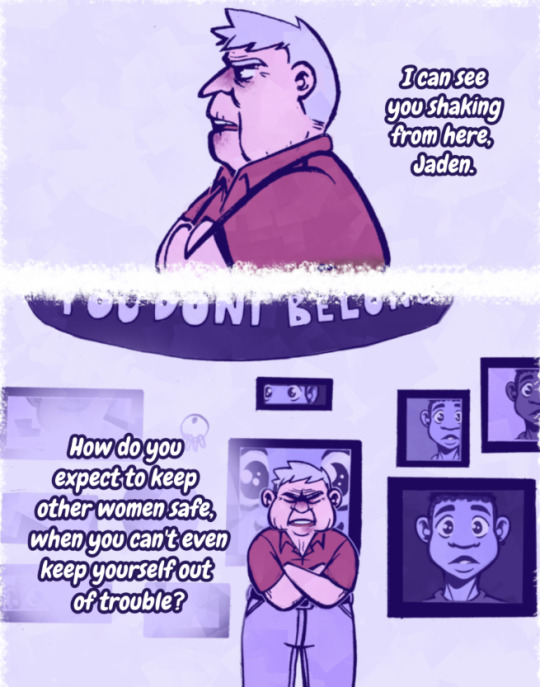


Had the initial incident been more severe, this level of emotional aftermath might feel justified. However, as written, it perpetuates problematic tropes about Black characters' vulnerability while missing opportunities for more nuanced character development.
This characterization becomes particularly problematic when viewed alongside the established history of Black character stereotypes in media, where emotional depth is often sacrificed for either excessive strength or excessive vulnerability, rarely allowing for the complex middle ground that more privileged and non-black characters are afforded. (Examples will be mentioned below)
Anyway, that is all darlings~! Follow for more analyses!
Television Examples:
Miranda Bailey in early seasons of "Grey's Anatomy" was initially written as the stern, unshakeable "Nazi" nickname character, only to later swing to extreme vulnerability after her divorce and OCD storyline, with little middle ground character development compared to her white counterparts
Michonne from "The Walking Dead" was initially portrayed as an almost superhuman warrior, before being reduced to primarily emotional storylines about her children, missing the nuanced character development given to characters like Carol or Maggie
Film Examples:
In "The Help" (2011), the Black characters are written either as unshakeable pillars of strength (like Aibileen) or as completely victimized (like Minny in her abuse storyline), while the white characters get more nuanced emotional arcs
The contrast in Marvel's "Black Panther" between the writing of Okoye (portrayed almost exclusively as the unwavering warrior) versus the more nuanced character development afforded to non-Black characters in other Marvel films like Black Widow or Thor who get to show both strength and vulnerability organically
Literature Examples:
In many young adult novels, Black best friend characters are often written either as the "sassy, strong support" (like Christina in the "Divergent" series) or as tragic victims of racism (like Khalil in "The Hate U Give"), while white protagonists get more complex emotional journeys
This polarity affects not just dramatic roles but extends to comedy as well, where Black characters are often written as either the "strong, sassy friend" or the "comedic victim," missing the rich middle ground of human experience that non-Black characters are routinely given. These examples demonstrate the ongoing issue in media where Black characters are often denied the full spectrum of human emotion and experience, instead being written into these extreme poles of characterization.
19 notes
·
View notes
Text
Welcome, dashin' and darlin's, to Review Room~!
This blog is strictly for reviewing media like webcomics, comics, and videos.
One webcomic we will be looking at currently is Leasebound by the Australian lesbian webcomic creator Rusty Hearts, who is quite popular amongst TERFs and gender criticals on platforms like Tumblr, Lolcow, Instagram, and more.
The following tags will be used: #Reviewing, #Finished, #Pending, #Current
Tags will be updated once all reviews for a particular media are done, such as at the end of a chapter or if the content is simply ongoing.
Have fun reviewing with me, darlings~!
0 notes